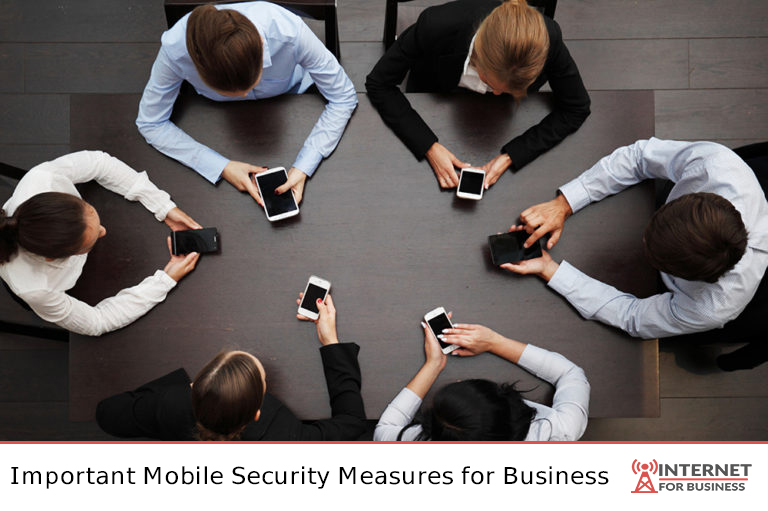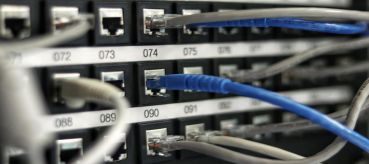Important Mobile Security Measures for Business

Businesses are constantly allowing workers to operate remotely and from a variety of devices as a result of the pandemic of 2020. This style of work has many advantages, including better communications, the ability to respond quickly to pressing problems, and a healthier work-life balance for workers. However, the security issues of expanding the corporate network to remote areas, which are more challenging to control.
This creates more opportunities for malicious actors to gain access to sensitive data. Businesses may benefit from the ease that mobile systems provide, but mobile security should not be overlooked. Several procedures can be followed – and monitored by any reputable IT support company near you – to ensure that your company network remains safe at all times.
Use safety devices to work with
Corporate-owned, personally-enabled (COPE), or choose-your-own-device (CYOD) policies are common in the workplace. It's better to choose manufacturers and operating systems that send security updates to users as soon as they're available. An iPhone running iOS, a Google Pixel running Android, or a BlackBerry Key 2 running Android are all examples of this. To prevent security bugs, software updates must be received often enough, and handset models must be replaced to keep up with the updates.
Also Read: The Best Cell Phone Plans For Small Business for 2021
Security managers cannot monitor the situation when external organizations support bring-your-own-device (BYOD) policies, but they can implement other security measures.
Remote Lock
Businesses can restrict the threats to a mobile device and add an extra layer of security to the network and data by introducing a remote lock and data wipe policy. When a computer is suspected of being missing or stolen, malicious attacks can be prevented by remotely locking or erasing all data.
When mobile devices are used for both business and personal purposes, this can be an issue. On the other hand, it is possible to set up two separate environments on a computer, one for personal use and one for business use. The choice to delete only the business data would then be available.
Liability protection for cybercrime / Cyber liability insurance
The damages sustained as a result of a data breach would be covered by this form of insurance. Mobile users are more vulnerable to phishing attacks because they allow for real-time monitoring of emails. Mobile devices may be protected from phishing and other forms of cyberattacks if they have cyber liability insurance.
Mobile devices have evolved into a major threat vector, and they are often the weakest link in a company's network. When cyberattacks happen, companies must act quickly to prevent any data breaches. Since these can be incredibly expensive, business owners would be wise to invest in insurance plans that cover smartphone attacks.
Using public Wi-Fi as little as possible
Public Wi-Fi is one of the most significant possible risks associated with the use of mobile devices. As workers use unprotected Wi-Fi networks, hackers can easily gain access to the system and corporate network and steal data. Hackers always wait for users to connect to unsecured public Wi-Fi networks before exploiting them. They may also set up ‘honey trap' Wi-Fi networks with a common name, such as Airport Wi-Fi, to attract customers.
Employees must be made aware of the threats, and a clear policy of only using secure networks while using business apps must be enforced.

Mobile Device Management
Mobile Device Management, also known as enterprise mobility management (EMM), is a suite of tools for managing and enforcing policies on company employees' mobile devices. This may involve using an app whitelist or blacklist, configuring devices to adhere to company standards, requiring system passcodes, or remotely deleting data on lost or stolen devices.
Mobile Device Management will ensure that devices are installed properly and that corporate practices are followed, but it cannot include information about the risks raised by mobile apps. VMWare Airwatch, IBM MaaS360, and Microsoft Intune are some of the most common MDM solutions.
Biometrics
Poor passwords are responsible for a large percentage of data breaches in businesses. Two-factor authentication (2FA) is the most secure method of password protection, though it can still be hacked.
Biometric technology adds an additional layer of protection to the equation. This makes use of biological features unique to a person, such as a fingerprint, iris, face, or voice recognition. Biometrics can also help organizations with transparency since users can be easily tracked. Users would also have more immediate access to their computers.
Internet of Things (IoT) Device Security
IoT devices are susceptible to cyber-attacks and must be protected in the same way as mobile devices are. The use of an isolated network, such as a virtual LAN system, is a common response to this situation. The hazard can be contained if IoT devices are isolated from the main network.
Businesses can also switch off features that aren't being used, such as a fax-capable wireless printer. IoT devices, including mobile devices, may use encryption to add another layer of protection.
Also Read: How to Set Up and Optimize Wi-Fi Network for Small Business
Mobile devices and users are quickly evolving, and businesses will soon be unable to resist using mobile technology. This potential for attacks and data breaches can be handled if we can pursue a sensible and stable mobile use practice. We may reap the benefits of technology while avoiding the risks.
Related Posts
Wed, Apr 22, 2020 11:34 PM
Find Verizon Internet for Business Near You!
Verizon provides Internet for business in more than 40 states in the US, speeds are limited to 15 Mbps, and many businesses will need more juice. If you're in the Northeast, you can enjoy high-speed Internet via Verizon's FiOS. This is ideal for businesses that need high speeds, such as restaurants, hotels, medical facilities, hospitals, schools, and other businesses.
Thu, Apr 23, 2020 12:00 AM
5 Best Small Business Internet Service Providers (2021)
The following Internet Service Providers are not listed in any particular order, but we have ranked these five companies as worthwhile due to some key factors such as speed, reliability, cost, and overall customer satisfaction.
Mon, Apr 20, 2020 11:13 PM
Business Internet Guides for Entrepreneurs
Small businesses need to grow, but how big should your business become before you buy it online? Whether you started out as a sideshow or a brick-and-mortar business, successful small businesses are finding it increasingly difficult to decide when to shell out money for an Internet business.
Thu, Apr 23, 2020 11:52 PM
Why Business Internet is More Expensive Than Residential Internet
This question is asked so often today that it seems worth explaining, but here are 5 reasons why business Internet is more expensive than Residential Internet packages.
Fri, Apr 24, 2020 5:17 AM
Comcast Internet For Business: Internet, Phone, TV, and Other Solutions for your Business.
Comcast Business is US largest cable provider for small and medium-sized businesses and has become a force in the market, recognized by leading industry over the past two years as one of the fastest-growing providers of high-speed broadband to business customers




